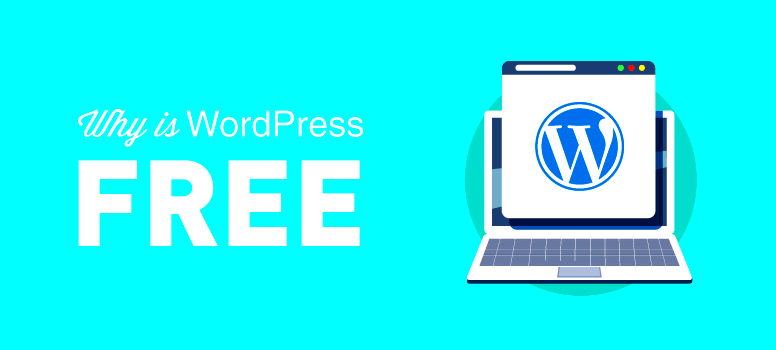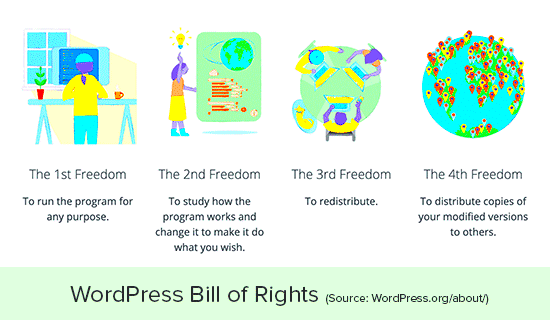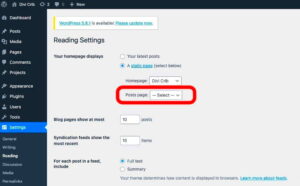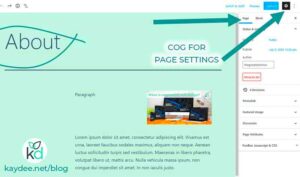When considering a website, one of the first names that pops up is WordPress. But, is it really free? The answer is a bit more layered than you might think. While WordPress itself is an open-source platform that you can download and use without any cost, there are other factors to consider that could add expenses to your project. In this article, we’ll break down what
What is WordPress?

WordPress is a powerful content management system (CMS) that allows users to create and manage websites easily. It was initially launched in 2003 as a simple blogging tool but has evolved into a versatile platform that accommodates everything from personal blogs to complex business websites. Here’s what makes WordPress stand out:
- Open-source Software: WordPress is free to use, modify, and share. Developers from all around the world contribute to its ongoing development, making it a continuously evolving platform.
- User-Friendly Interface: Even if you don’t have a tech background, WordPress’s intuitive dashboard makes it easy to create and manage content.
- Highly Customizable: With thousands of themes and plugins available, you can tailor your website to fit your unique vision and style.
- Community Support: WordPress has a vibrant community of users and developers. You can find forums, tutorials, and resources to help you troubleshoot issues and enhance your website.
To sum it up, WordPress is not just a blogging platform; it’s a robust CMS that offers flexibility and a host of tools to help you bring your online presence to life. The possibilities are nearly limitless, but understanding the distinction between the free software and the costs involved in hosting and customization can help you plan your project better!
Understanding the Different Versions of WordPress

When we talk about WordPress, it’s essential to differentiate between the two primary versions: WordPress.com and
Let’s break it down:
- WordPress.com: This is a hosted platform, meaning that the hosting provider takes care of server maintenance for you. It’s relatively straightforward to use, especially for beginners. You can start for free, but there are limitations. To unlock features like custom domains and advanced design customization, you may need to upgrade to a paid plan.
- WordPress.org: In contrast, this is a self-hosted solution. It’s an open-source platform that you download and install on your own web server. While it demands a bit more technical know-how, it offers ultimate flexibility and control. You can install plugins, customize themes extensively, and monetize your site without restrictions.
Here’s a quick comparison:
| Feature | WordPress.com | WordPress.org |
|---|---|---|
| Hosting | Included | Self-hosted |
| Customization | Limited | Unlimited |
| Monetization | Restricted | Full control |
| Cost | Free with premium options | Free software, but hosting costs apply |
Understanding these two versions will help you make informed decisions as you embark on your WordPress journey!
The Cost of Hosting and Domain
Now, let’s talk about one vital aspect of running a WordPress site—the cost of hosting and domains. These are essential components that contribute to the overall expense, and it’s important to budget for them wisely.
Firstly, let’s explore the concept of hosting:
- Web Hosting: This is where your website’s files are stored and accessed online. Prices can vary significantly based on factors like performance, customer support, and storage options. Typical costs can range from $3 to $30 per month for shared hosting solutions, while managed WordPress hosting can go up to $50 or more per month.
- Domain Name: This is your website’s address on the internet (like www.yoursite.com). The average cost for a domain name is around $10 to $20 per year. Keep in mind that specific domains (.com, .org, etc.) might have different pricing.
Here’s a breakdown of potential costs:
| Expense | Estimated Cost |
|---|---|
| Web Hosting | $3 – $50/month |
| Domain Name | $10 – $20/year |
| SSL Certificate | $0 (free options) – $100+/year |
| Premium Themes/Plugins (optional) | $30 – $200/year |
Be sure to factor these costs into your planning. Remember, you can start small and scale as your website grows!
Free vs. Paid Themes and Plugins
When diving into the world of WordPress, one of the first decisions you’ll face involves choosing between free and paid themes and plugins. This choice can significantly influence the site’s look and functionality. Let’s break down the pros and cons of each!
- Free Themes: – Accessible right from the WordPress Theme Directory. – Good for beginners or those on a tight budget. – Lightweight and often easy to customize.
- Paid Themes: – Generally more sophisticated with advanced features. – Often come with dedicated support and regular updates. – Enhanced customization options to align closely with branding.
Now, let’s talk about plugins. They are essential for adding functionalities to your WordPress site.
- Free Plugins: – Can be a great tool for basic functionalities like SEO, backup, or social sharing. – However, they might lack extensive features or customer support.
- Paid Plugins: – Usually come with premium features that can elevate your site’s performance. – Provide comprehensive support and updates which is beneficial in the long run.
Ultimately, the choice between free and paid comes down to your specific needs. If you’re just exploring, free options are an excellent starting point. But, as your site grows and you want more control and features, investing in paid themes and plugins might be the way to go.
Design Freedom on WordPress
One of the standout features of WordPress is its design freedom! This platform allows you to create a website that truly reflects your unique vision without needing to be a coding wizard. Whether you’re an amateur blogger or a business owner, the ability to tailor your site is invaluable. Here’s how WordPress grants you that creative liberty:
- Customizable Themes: – Choose from thousands of themes available in the WordPress directory, each one has its own style and layout options. – Most themes come with customization options that let you change colors, fonts, and layout designs.
- Drag-and-Drop Builders: – Tools like Elementor or Beaver Builder make it incredibly user-friendly to design your pages. – You can easily see changes in real-time as you arrange elements on the page.
- Advanced CSS: – If you have some knowledge of coding, you can further customize any theme using CSS. – This is perfect for those looking to add personal touches that stand out.
In addition, WordPress also supports various plugins that enhance design capabilities. For example, plugins for sliders, galleries, or custom post types can completely transform your site. The freedom to mix and match these elements is what makes WordPress a favorite among designers.
In conclusion, whether you opt for a simple layout or a complex design, WordPress provides the tools you need to express your creativity. It’s all about finding the right combination that aligns with your goals while ensuring your site remains user-friendly!
Customizing WordPress: What You Can Do for Free
When it comes to customizing WordPress, one of the biggest draws is that much of its flexibility comes at no cost. Whether you’re a complete newbie or a seasoned developer, there’s a lot you can explore without reaching for your wallet. Here’s what you can do for free:
- Themes: WordPress offers thousands of free themes in its repository. You can easily browse these themes and find one that suits your style, from blogs to portfolios and business sites.
- Basic Customization: Using the built-in Customizer, you can tweak things like colors, fonts, and layouts. This allows you to make your site feel a bit more “you” without requiring any coding knowledge.
- Plugins: The WordPress Plugin Repository boasts over 50,000 free plugins, which can extend the functionality of your site. Want to add contact forms, enhance SEO, or improve site speed? There’s probably a free plugin for that!
- Widgets and Menus: You can manage your site’s layout using widgets and menus to create a unique navigational experience. Rearranging your site just got a lot easier.
- DIY Coding: If you’re feeling adventurous, you can dabble in some custom CSS. This allows you to adjust styles even further, giving a unique look to your site.
Of course, while there’s a lot of freedom in these options, some limitations exist. Free themes might not be as feature-rich, and some plugins may have limited functionality without upgrades. But the beauty of WordPress lies in its community; there are countless tutorials and forums to help you on your customization journey!
Benefits of Premium WordPress Options
While the free offerings of WordPress are undeniably appealing, premium options bring a level of convenience and enhanced functionality that can elevate your site to new heights. Here’s a snapshot of what you can expect:
| Benefit | Description |
|---|---|
| Premium Themes | With premium themes, you often enjoy advanced features, more customization options, and superior support. They typically look more polished and provide an intuitive user experience. |
| Enhanced Security | Many premium plugins come with built-in security measures to protect your site from common vulnerabilities, giving you peace of mind. |
| Dedicated Support | You often get access to professional support. This makes resolving any issues you encounter significantly easier. |
| Regular Updates | Premium themes and plugins typically receive regular updates. This ensures compatibility with the latest version of WordPress and enhances functionality. |
| Advanced Features | Many premium options offer features like SEO optimization tools, eCommerce capabilities, and multilingual support, making your site more robust. |
In conclusion, investing in premium WordPress options can save time, ensure better performance, and provide a beautifully tailored user experience. It’s important to weigh the need for these features against the costs, but for many, the benefits clearly outweigh the price tag.
9. Common Misconceptions About WordPress Costs
When it comes to WordPress, a lot of myths and misconceptions float around regarding its costs. You might hear someone say, “WordPress is completely free, right?” While it’s true that the basic software is free, there’s a lot more to consider. Let’s dive into some common misconceptions that can lead to confusion.
- Misconception 1: WordPress is Free, So It Has No Hidden Costs – Many new users assume that if WordPress is free, they can set up a website without any costs. However, expenses can quickly add up with hosting, domain registration, premium themes, and plugins.
- Misconception 2: You Can’t Make Money with WordPress – Some think that using WordPress will limit their revenue potential. On the contrary, countless businesses and individuals have built thriving online ventures using WordPress.
- Misconception 3: All Plugins and Themes are Free – While there are many free options available, premium plugins and themes often provide advanced functionalities that come at a cost. You may find that investing in these can significantly enhance your site.
- Misconception 4: WordPress.com is the Same as WordPress.org – WordPress.com can be free, but it has several limitations and may not provide the level of design freedom that WordPress.org offers. The latter gives you full control over your site.
- Misconception 5: Maintenance Costs Aren’t a Factor – Many users overlook the time and financial investment needed for maintenance. Regular updates, security measures, and backups all require attention and possibly additional costs.
Understanding these misconceptions can help you realize the full scope of financial planning needed when using WordPress.
10. Conclusion: Is WordPress Really Free?
So, after breaking down the costs and dispelling some common myths, let’s revisit the essential question: Is WordPress really free? The answer isn’t a simple “yes” or “no.” It really depends on what you plan to do with it.
Here’s the gist:
- If you just want to set up a simple blog and are willing to work within the constraints of free hosting and themes, you can indeed use WordPress at no cost.
- However, if you’re aiming to create a more sophisticated website (like an e-commerce store or portfolio), you should anticipate certain expenses. These might include:
- Hosting fees
- Domain name registration
- Premium themes and plugins
- Possible professional development or maintenance services
In conclusion, while the core software of WordPress is free to use, creating a fully functioning, robust website often requires financial investment. Still, given its flexibility and potential, many find it to be an excellent return on investment. So, to truly master the question of whether WordPress is free, consider both the initial and ongoing costs, and weigh them against the value you can gain.



